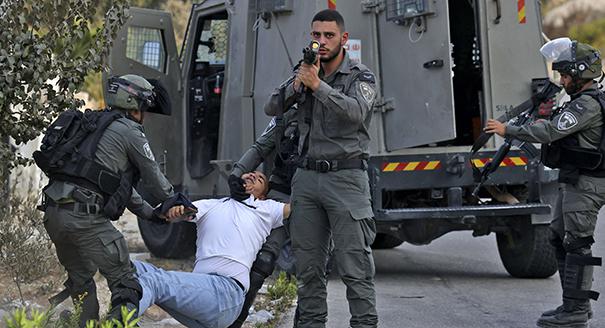Nur Arafeh is a fellow at the Malcolm H. Kerr Carnegie Middle East Center whose work focuses on the political economy of the MENA region, business-state relations, peacebuilding strategies, the development-security nexus, and the Palestinian-Israeli conflict. Diwan interviewed Arafeh in October to ask her about three issues of direct relevance to the future of the Palestinians: the response to Israel’s increasingly repressive tactics in the occupied West Bank; the perennial quest for statehood; and the matter of leadership succession.
Michael Young: Recently there have been warnings of a new Intifada in the West Bank. Is this likely?
Nur Arafeh: A wave of armed resistance is sweeping across the West Bank. At the heart of this wave lies a new group called “Lions’ Den.” This group encompasses young men from various political factions who have been mounting resistance against the Israeli army when it raids Nablus city or Jenin refugee camp, or when Israeli Jewish settlers, escorted by Israeli soldiers, storm Joseph’s Tomb in Nablus.
Lions’ Den has gained much popularity among Palestinians, as evidenced by the widespread adherence to the group’s call to hold a general strike on October 12 in solidarity with the civil disobedience campaign declared by Shu’fat refugee camp following a lockdown imposed by Israel a few days earlier. And while this wave of resistance largely started in Jenin refugee camp and Nablus, it has since spread across much of the West Bank, including East Jerusalem, Hebron, Bethlehem, and Ramallah, among other cities.
However, for the wave to sustain itself, mobilize a critical mass of Palestinians, and expand into something of the magnitude of the First Intifada and the Second Intifada, which broke out in 1987 and 2000, respectively, it would need a solid organizational foundation, as well as a unified vision and a strategic political program. Yet, with the exception of Islamic Jihad, the major Palestinian factions have so far steered clear of getting involved. And Mahmoud Abbas, the president of the Palestinian Authority (PA), has attempted to quell resistance activities by the Lions’ Den—initially by arresting key figures in the group, and more recently by proposing to them that they surrender their arms and join PA security forces.
Nevertheless, if there is an escalation in Israeli aggression and use of lethal force, or if Israel takes any further provocative steps on critical issues like the status of Al-Aqsa, a new Intifada could conceivably erupt.
MY: Will the Arab agreements with Israel lead to a fundamental transformation in the Palestinian approach to Israel and to an overall settlement? If so, how?
NA: One of the main ramifications of the Arab agreements with Israel is the end of the “land for peace” model that was at the heart of the Arab Peace Initiative launched by the Arab League in 2002. According to this model, Israel would withdraw from the territories it occupied in 1967 and allow for the establishment of a Palestinian state in exchange for a peace deal with Arab countries and normalization of relations. However, this model was abandoned in the recent agreements, which were signed without any concessions made by Israel and without any condition that Israel end its occupation. The agreements were instead grounded in a new “peace for peace” model, as several analysts have called it. This paradigm shift has not only made Palestinians more isolated and more vulnerable by further exacerbating the asymmetry of power between them and the Israelis, but has also dealt a heavy blow to the Palestinian statehood project. Recall that achieving statehood as a precondition for Arab recognition of Israel was a pillar of Palestinian strategy, which was shattered by the recent normalization agreements.
The Arab agreements with Israel could have turned into an opportunity for the Palestinian leadership to reconsider its focus on the statehood project within the framework set by the Oslo Accords. Yet the leadership has so far proven unable or unwilling to reimagine a new political program, much less pursue a unified strategy, that would ensure Palestinian rights and freedom.
MY: What is the most likely scenario for when Abbas either dies or leaves office?
NA: According to Palestine’s Basic Law of 2005, in case of a vacancy in the presidency of the PA, the speaker of the Palestinian Legislative Council (PLC)—the PA’s parliament—becomes interim president until the next presidential election, which must be held within 60 days. This is what happened following the death of Yasser Arafat in 2004. However, Abbas’ dissolution of the PLC (whose speaker is affiliated with Hamas) in December 2018 has eliminated the possibility of this scenario, making succession difficult to predict.
A probable scenario is a power struggle within Fatah, which is deeply fragmented and characterized by strong competition among several contenders as to who should succeed Abbas. Such a power struggle is likely to be chaotic, exacerbate divisions within the Palestinian political arena, and lead to more regional and international interference in Palestinian affairs.
There are also question marks regarding whether Abbas will be succeeded by a single leader, who would preside over the Palestinian Authority, Fatah, and the Palestine Liberation Organization—as Abbas currently does—or by several “leaders,” each presiding over a specific entity or even a specific geographic area. Should the latter scenario materialize, chances are that it would cause more chaos and further atomize Palestinian society.






